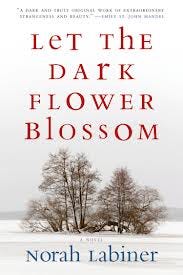Books & Culture
Review: Let the Dark Flower Blossom, by Norah Labiner

A literary meta-thriller about murder, writers, and the art of stories

Norah Labiner’s Let the Dark Flower Blossom is the kind of book in which, early on, a character says that he has “never found any justice in poetry,” and the reader is meant to nod thoughtfully, not chuckle. This is a literary thriller about the process of writing, and, like that process, it consists of many good ideas, and some puzzling ones.
At its center, the novel is a mystery about a murdered writer, Roman Stone, and the two orphaned siblings, Sheldon and Eloise Schell, who were once his closest friends. But Labiner’s novel keeps growing bigger, gathering mysteries like a katamari ball gathers fences and, soon, houses: How did Sheldon and Eloise’s parents die (and why won’t anyone ever tell it straight)? Why is a writer named Salt coming to visit Sheldon? What does Sheldon hope to reveal by writing his own memoir, full of secrets? And what about Susu, the young woman in the hotel room who seems very interested in discussing the conventions of storytelling?
And, of course, the biggest mystery of all: Am I supposed to give a shit about this plot, or is this just another experimental novel designed to jerk me around — baiting me with these mysteries only to start in about the artifice of narrative, or whatever the hell people talk about when they’re smarter than I am?
Labiner plays the meta-fiction game well, if predictably. Sometimes she uses it to run defense (“Not all books are for all people,” Eloise remarks at one point). Other times, Labiner demonstrates a David Shields-worthy suspicion of plot-driven novels (“where one thing happens and then another and then a girl is naked”). In a revealing moment, we learn what kind of book Susu would be: “Not the sort that is easily understood or enjoyed. She was not a best-seller or a page-turner. No, rather, she was a great novel, a book whose greatness rests entirely in the willing reader’s heart.” In short, Susu would be LtDFB. Did I mention that Susu is the novel’s closest thing to a heroic character?
The plot is somewhat confusing, but that confusion is, for the most part, very fun — especially when rendered in Labiner’s exquisite prose. I’m always suspicious of beauty for its own sake; but here, the novel needs to be beautiful, or it all falls apart. Labiner excels at enumeration — accumulating an avalanche of detail instead of throwing one perfectly packed snowball.
The major characters are fascinating — especially Roman Stone, who is an idealized version of a genius writer (super-famous bad boy, wrote his first novel in 30 days when he was 20 years old), but when he speaks in flashback, he sometimes says things like, “You sentimental fucked up motherfucker” — an occasionally startling, and humanizing, lack of eloquence. I admired Labiner’s handling of Eloise, among the novel’s trickiest characters, but also one of the most human. Her relationship with her husband Louis, a lawyer who specializes in defending guilty clients through dubious means, is an interesting, though somewhat dead-ended, subplot.
This is a novel of fragments — just flipping through its pages gives the impression that the book was written by different writers, from Susu’s paragraph-less blocks of text, to Sheldon’s conventional formatting. Halfway through, LtDFB turns into a flood of short, numbered sections, some of them just one sentence long (à la Steve Erickson, or Maggie Nelson in Bluets). Here, the book occasionally becomes too vertiginous for its own good, spiraling from character to character like a version of Magnolia in which we keep forgetting who Tom Cruise is playing.
Eventually, the mysteries are revealed. There’s murder, and incest, and in a way, Labiner does the opposite of what I mentioned before: She baits me with a bunch of “intellectual” meta stuff about the artifice of fiction, and then gets all Gillian Flynn on my ass. I like that.
So, while Norah Labiner’s novel frustrates in the way this kind of book often frustrates — themes too explicit, narrative too fragmented, author too clever — it still possesses a genuine sense of drama and mystery. Unlike many writers of meta-fiction, Labiner rewards, not mocks, the reader’s investment in the plot and characters. This isn’t a perfect novel, but it is a genuine and, despite its experimental trappings, friendly book.
Recommended if you liked: The End of the Story by Lydia Davis, The Collector by John Fowles, Threats by Amelia Gray
***
— Benjamin Rybeck’s reviews have also appeared in V Magazine. His fiction has received “special mention” and “notable reading” distinctions from The Pushcart Prize Anthology and The Best American Nonrequired Reading, respectively.









